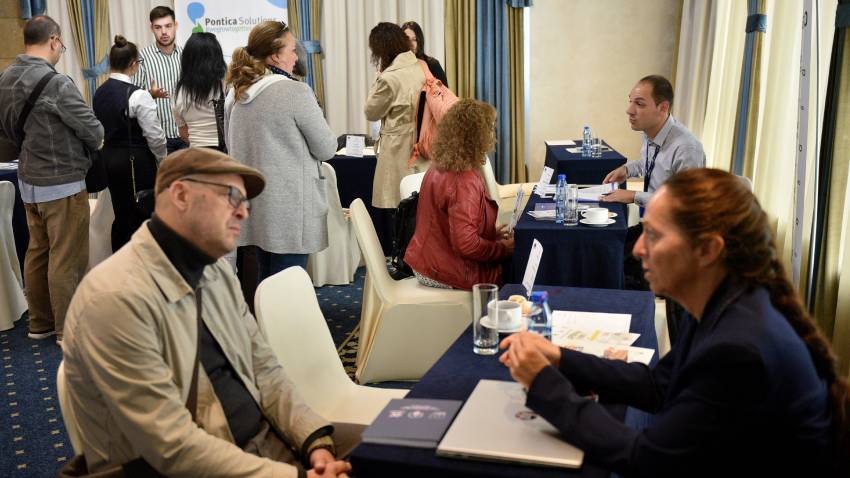Yet Bulgaria remains uncompetitive as regards payment and working environment
Employers in Bulgaria have been experiencing staff shortages for years – of both high and low-skilled workers. According to data of the Bulgarian Employment Confederation, the right people can be found for no more than 30% of the openings on the labour market. The main reason for this, the Confederation says, is that Bulgaria has an ageing population, while the young generation are not ready, or do not want to enter the labour market. 
There is also significant migration of Bulgaria’s working-age population towards the wealthier countries of Europe, attracted by better working conditions and higher pay. The imbalance between labour demand and supply has settled permanently in Bulgaria, experts say. The only way, albeit insufficiently utilized, to pump workers into the Bulgarian economy, is to attract workers from other countries. More than 23,000 people coming from non-EU countries received work permits in Bulgaria in 2023 alone. Every year, one of the biggest trade unions in Bulgaria – the Confederation of Independent Trade Unions in Bulgaria, CITUB, collects data and conducts a survey on labour migration and its role in the country’s labour market. According to the CITUB’s report, the new hires come from many different nationalities.
“A lot of people from countries which are not far from Bulgaria like Ukraine, Uzbekistan, Kirgizstan, Turkey received work permits in this country last year. But companies have been hiring people coming from more distant countries as well – like Brazil, the US, Nepal, Taiwan etc.,” Atanaska Todorova, trade union expert in the labour market, labour migration and mobility sector says in an interview with Radio Bulgaria.  Construction comes first, followed by the category of workers employed in industry – the processing industry, clothing. The number of foreign citizens employed in Bulgaria on a long-term basis has gone up by 66% in the space of one year, says Atanaska Todorova:
Construction comes first, followed by the category of workers employed in industry – the processing industry, clothing. The number of foreign citizens employed in Bulgaria on a long-term basis has gone up by 66% in the space of one year, says Atanaska Todorova:
“During the past year, almost 40% of the people who have received a residence and work permit, left Bulgaria in the first 6 months to go to other European counties. The problem with the labour shortage and providing workers from non-EU countries is connected with the fact that employers are unable to retain the incoming workers. Employers should think very carefully about what they can offer, especially in the category of short-term workers, because that is the category where payment is unattractive. The same holds true of the Bulgarian workers as well. In tourism, for example, they are hired for pay that is close to the minimum salary. In construction, salaries may be higher, but the working conditions there are far from satisfactory. So, even though a great many work permits have been issued to foreigners in 2023, the big challenge remains the pay, or how employers can retain these workers. And one of the reasons economic migrants leave their own country is to be able to support their families back home. Much like the Bulgarians working abroad – they want to be able to send money back to Bulgaria,” says Atanaska Todorova.
Translated and posted by Milena Daynova
Photos: freepik.com, BTA, archive
"We cannot escape from modern technologies, but we must think about how we can use artificial intelligence to improve the quality of education without losing human contact," said Mimi Nicheva, head of the Bulgarian Sunday School "Sts...
Nearly two centuries ago, in the distant 1838, the Bessarabian Archbishop Dmitry Kishinev and Khotinsky consecrated the magnificent Orthodox church "The Holy Transfiguration of the Lord" , built with voluntary donations and labor by the Bulgarian..
Bringing youthful energy, colour and cheer to the Bulgarian National Radio studio, students from the Bulgarian Sunday School Dr Petar Beron arrived from Larnaca. The group from Cyprus — 16 pupils aged between 14 and 19 — is currently on a week-long..
The so-called Seal of Biliteracy was created in 2011 in the US state of California with the idea that in the conditions of a globalized..
On 27 October, the first meeting of Action CA-24150 “Values in Turbulent Times: Navigating Social Change and Challenges (VISTA)” took place in Brussels...
In the summer of 2014, photographer Philippe Bazin and philosopher Christiane Vollaire traveled around Bulgaria, investigating a series..

+359 2 9336 661
